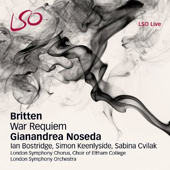
ESSENTIAL RECORDINGS

Rare are the musical creations that immediately and readily disclose and convey their sentiment, their emotional catalyst, and rarer still are the ones
who leave a profound and indelible impression in the process. The War Requiem by Benjamin Britten
(1913-1976) is one of those exceptional works. Barely two and a half minutes into the opening Requiem aeternam and it's already clearly
obvious that we are in for a solemn and tragic musical statement. Benjamin Britten's aptitudes for the opera, for the dramatic and for orchestral
effectiveness all come to the fore and merge together in this powerfully affecting work.
Premièred 50 years ago in 1962, the War Requiem was commissioned for the re-dedication of the new cathedral at Coventry, since the
previous edifice had been destroyed by the German bombing raids during the Second World War. The text is a merging of the proper from the Latin
Mass (soprano, choir and orchestra) with war poems by Wilfrid Owen (tenor, baritone and orchestra). Personally, I believe the distinction was made to
emphasize the fact that the Church was powerless against the evils of the War. What solace or reassurance can the Kyrie eleison, however
sublime it's harmonic beauty may be, summon against the powerful words of What passing-bells for those who die as cattle?
Needless to say it takes a commited and emotionally credible performance to bring off a work of this magnitude, especially when some of the extant
recordings {Britten himself on Decca, Shaw on Telarc, Hickox on Chandos, and Rilling on Hänssler} make for some fierce competition, and that is
precisely what conductor Gianandrea Noseda brings to this "live" performance captured at the Barbican, London in October 2011.
From the very first pages, he sets a slower, darker, more foreboding tone than Britten himself. The hushed, time-suspended, barely audible renditions
of the Kyrie eleison and the Pie Jesu Domine by the London Symphony Chorus are deeply moving and
awe inducing. The balance and juggling act between the tenor, baritone, distant organ and boys' chorus in the Hostias et preces tibi is
tremendously sharp and precise when you consider that this is caught "live" in a big venue. The mighty Sanctus, derivative of Mahler's
8th Symphony, leaps out like a great uproar of anger, with both the choir and orchestra clamouring for an answer. The Libera me has
never sounded so much like the petrified lament that it is as it does here in this recording. It's quite simply terrifying. Soprano Sabina Cvilak
is outstanding here, but then again, so is everyone else. There's enough commited energy contained in every note to make the ground tremble. Both
Ian Bostridge and Simon Keenlyside are also at their best here during their final Let us sleep now.
And of course the final Amen wraps everything in eternal darkness ...
The Barbican Centre's acoustics have often been criticized, oddly enough for being either too dry or for being excessively resonant, even after several
expensive acoustical studies and upgrades have been inflicted on it. Somehow, the engineers involved in this LSO recording seem to have
tamed the beast. It could do with a little more headroom in the really heavy passages, but aside from that it's perfectly fine. I've only listened to it
in plain old 16-bit stereo, so I can only imagine how good it must sound in its SACD Surround format.
Jean-Yves Duperron - June 2012